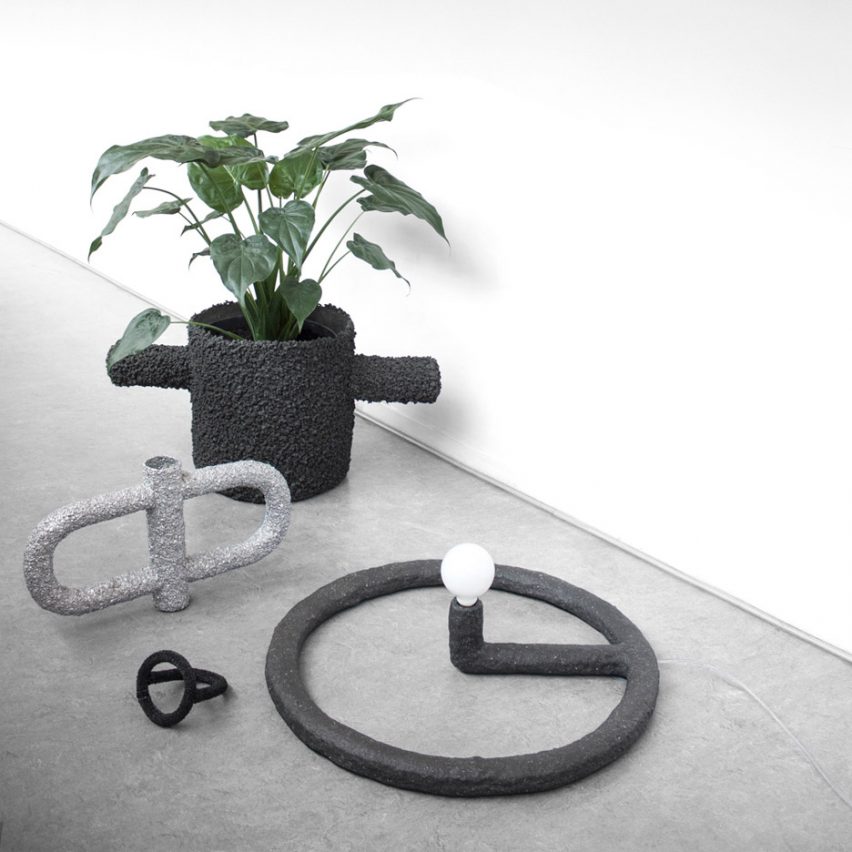Danish textile designer Stine Mikkelsen has crushed granite, melted tin and torched rope to create this collection of bizarre-looking furniture for Miami's Aybar Gallery.
The rugged finishes of Mikkelsen's Tactile Monoliths are based on objects found in the harbour of her hometown, Marstal, which is located in Aero – one of Denmark's Baltic Sea islands.
The designer is now based in Copenhagen, where she handmade the collection for the Aybar Gallery.
Before designing the shapes of the sculptural pieces, Mikkelsen started the project with a series of material experiments using crushed granite, tin and rope.
While some of the objects have obvious uses, such as a plant pot with two large handles that extend either side and a circular floor lamp, others are more obscure, which Mikkelsen says offers an element of intrigue.
"I am trained as a textile designer, but have been working more with materials in general," Mikkelsen told Dezeen. "As a textile designer, you often work with building up collections, which means your focus is on finding a harmony in combining for instance textures, size and colours."
"By using the textile design methods to make objects, the material and the process of making is always the starting point," she added. "Through experiments I get to know and understand the material and with the gained knowledge, I can start sketching objects."
Earlier this year, Norwegian designer Sigve Knutson produced a similarly obscure collection of lumpy objects inspired by his line drawings and made using materials such as clay, aluminium, silicone and ceramic.
The crushed granite is combined with fish glue – a natural binder made from fish by-products – and then left to set in moulds.
"To get the texture on the objects, I crumble the material by hand, and because of the glue in the composite, it sticks to the mould," she said. "Depending on the shape of the object, I can remove the mould afterwards or let it stay inside the object."
She sanded some of the granite pieces down to create a smooth finish suitable for the stool and lamp.
The bubbly texture of the tin objects, including one that resembles the curved end of a pipe, is created by melting the metal with a soldering iron and allowing it to drip into a mould. "In this way, I can make a texture that looks like water; shiny and alive," she added.
To create the rope's rough texture, Mikkelsen melted it using a small hand-tool that is commonly used for burning wood. The rope has been looped into various shapes, including the smallest piece in the collection.
Tactile Monoliths forms an extension of the experiments Mikkelsen started in her final project at Denmark's Kolding School of Design, where she graduated earlier this year with a masters in textile design.
The collection also includes a structure with a vaulted base and a vertical column on top that reaches 93 inches tall (263 centimetres), an H-shaped piece, and another bold, black design that resembles an M. Mikkelsen is currently experimenting with making pieces from basalt.
Aybar Gallery is planning to it exhibit the collection early next year at its Miami showroom on 290 NE 71st Street. Mikkelsen joins its roster of acclaimed designers that includes Studio Formafantasma, Bertjan Pot and Richard Hutten.
One of the gallery's previous shows includes a collection of impenetrable concrete-like blocks that form packaging for perfume.

